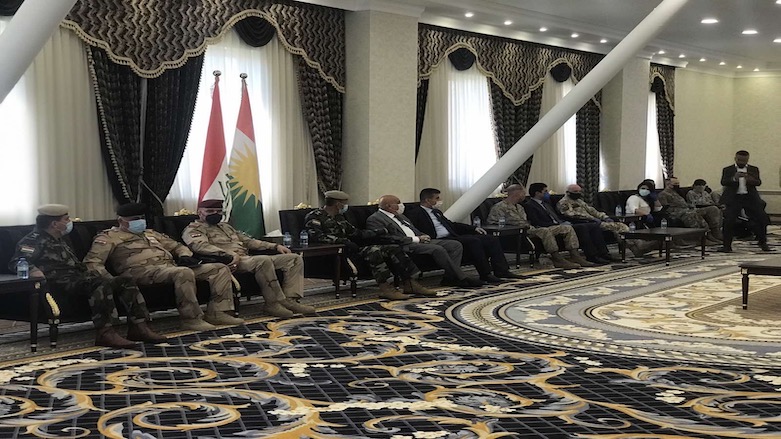Ministry of Peshmerga, Defense Ministry convene to discuss joint operations

ERBIL (Kurdistan 24) – On Monday, a high-ranking delegation from the Iraqi Defense Ministry arrived in Erbil to discuss joint operations in the disputed territories with the Kurdistan Region’s Ministry of Peshmerga.
The visit comes as part of ongoing talks between the two ministries on finding common ground to conduct military operations against the so-called Islamic State. Although the Iraqi government—under Prime Minister Haider al-Abadi—announced, already in December 2017, that the terrorist organization had been defeated, it has been resurgent for some time, particularly in the territories disputed between Erbil and Baghdad.
Read More: Iraq ‘totally liberated’ from IS, says PM Abadi
Officers from the US-led coalition, formally known as Combined Joint Task Force-Operation Inherent Resolve (CJTF-OIR), also attended the meeting. CJTF-OIR Spokesman, Col. Myles B. Caggins III, hailed the event in a tweet, describing it as a “big security meeting.”
The Coalition has long pressed for better coordination between the Iraqi Security Forces (ISF) and the Peshmerga. Already in June 2018, Gen. Joseph Votel, then head of CENTCOM, told Kurdistan 24, while he was on a visit to Erbil, that the threat from the Islamic State “still remains.”
“It will be very important that we work together,”Votel said—“the Coalition, the Peshmerga, the government of Iraq forces—to ensure that we keep the pressure on ISIS to prevent them from coming back.”
Read More: EXCLUSIVE: CENTCOM says Peshmerga and Iraqi forces must work together to defeat IS
Regarding Monday’s meeting, sources told Kurdistan 24 that the parties “are close to reaching an agreement.” The delegations have made progress, but have not yet finalized an accord.
The initial understanding would be that “any military operations in the disputed territories would be in coordination with and involve the participation of Peshmerga forces,” Jabar Yawar, General Secretary of the Ministry of Peshmerga, told Kurdistan 24. He said that he “hoped” a concrete agreement would be reached between the two sides.
Monday’s meeting between the regional and federal ministries is the fourth of its kind. Early this month, a high-level delegation from the Ministry of Peshmerga met with officials from the Iraqi Ministry of Defense to discuss security collaboration in those areas.
Speaking to the Iraqi media outlet, Shafaq News, after the meeting, the Peshmerga Chief of Staff, Gen. Jamal Emnaki, described it as “positive.”
Regarding the return of Peshmerga forces to the disputed territories, Emnaki explained that is an issue which his delegation will discuss with its Iraqi counterparts “in the upcoming meetings.”
“Agreement has been reached,” Yawar told Kurdistan 24, on joint security mechanisms in the disputed areas of Khanaqin, Kola Jo, and Makhmour, although not in Kirkuk.
Core of the Problem
The basic problem lies in the Iraqi assault on the Peshmerga in October 2017, which followed the Kurdistan independence referendum the month before. It was conducted under Iranian auspices, specifically Gen. Qasim Soleimani, head of the Quds Force of Iran’s Islamic Revolutionary Guard Corps (IRGC), whom the US would assassinate some two years later.
As the assault was being prepared, the US turned a blind eye, thinking it would preserve the unity of Iraq, as well as secure Abadi’s election in the upcoming elections.
The attack failed to gain Abadi a second term, of course, while it enhanced Iran’s influence in Iraq and promoted that of the Iranian-backed Shi’a militias.
The US position then was, in effect, a continuation of the Obama-era policy of appeasing Iran in Iraq. However, those responsible for the policy have all been replaced, including the National Security Adviser; Secretaries of State and Defense; as well as lower-ranking officials, including the Special Envoy to the Global Coalition against ISIS, and the US ambassador in Iraq. The US has now shifted toward a much tougher stance against Iranian activities in Iraq.
Yet one more consequence of the October 2017 assault on the Peshmerga has been the resurgence of the Islamic State in the disputed territories. When the Peshmerga controlled those areas, they did a relatively effective job in suppressing the terrorist organization.
But the effort to control them with the ISF and the Iranian-backed militias of the Popular Mobilization Forces has proven a failure. Hence, the need to bring back the Peshmerga and establish regular coordination between them and the ISF.
The ISF and Peshmerga had previously reached an agreement to increase collaboration, but it was never implemented, according to Kurdish officials.
Editing by Laurie Mylroie
